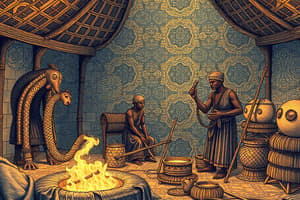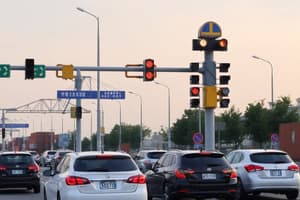Podcast
Questions and Answers
What is the most significant disadvantage of passing down history through oral tradition?
What is the most significant disadvantage of passing down history through oral tradition?
- It can be very time-consuming.
- It can be difficult to understand.
- It can be used to spread misinformation.
- It can lead to the loss of information over time. (correct)
What evidence suggests that Mansa Musa was a wealthy and religious man?
What evidence suggests that Mansa Musa was a wealthy and religious man?
- He had a large army and defeated many enemies.
- He was a wise and just ruler.
- He was a skilled diplomat and negotiator.
- He built mosques and went on a hajj to Mecca. (correct)
Which geographical feature borders the Mediterranean Sea in northern Africa?
Which geographical feature borders the Mediterranean Sea in northern Africa?
- The Atlas Mountains (correct)
- The Sahara Desert
- The Red Sea
- The Nile River
What is the primary environmental process that transforms fertile land into the Sahara Desert?
What is the primary environmental process that transforms fertile land into the Sahara Desert?
How did the introduction of camels significantly impact the Trans-Saharan trade?
How did the introduction of camels significantly impact the Trans-Saharan trade?
Why were oases in the Sahara an important gathering place for traders?
Why were oases in the Sahara an important gathering place for traders?
What was the primary reason for the high value of salt in the Trans-Saharan trade?
What was the primary reason for the high value of salt in the Trans-Saharan trade?
What was the most common use for slaves in the Trans-Saharan trade?
What was the most common use for slaves in the Trans-Saharan trade?
Which group played a significant role in spreading Islam across the Sahara?
Which group played a significant role in spreading Islam across the Sahara?
What were the main advantages for West African merchants who converted to Islam?
What were the main advantages for West African merchants who converted to Islam?
How did the Nok people contribute to the decline of their own culture?
How did the Nok people contribute to the decline of their own culture?
What was the key factor that made the capital of Ghana, Koumbi-Saleh, an advantageous location?
What was the key factor that made the capital of Ghana, Koumbi-Saleh, an advantageous location?
Why were Ghana's traders considered ideal middlemen?
Why were Ghana's traders considered ideal middlemen?
How did the king of Ghana ensure high gold prices?
How did the king of Ghana ensure high gold prices?
What significant role did Sundiata Keita play in the history of the Mali Empire?
What significant role did Sundiata Keita play in the history of the Mali Empire?
Which city became a prominent center for Islamic learning in the 1500s?
Which city became a prominent center for Islamic learning in the 1500s?
What primary purpose did griots serve in early African civilizations?
What primary purpose did griots serve in early African civilizations?
What is the primary reason why early African civilizations relied heavily on oral tradition?
What is the primary reason why early African civilizations relied heavily on oral tradition?
Flashcards
Nok People
Nok People
The first people in Africa to make tools from iron.
Terra Cotta
Terra Cotta
Fire-baked clay used for sculpting human figures.
Iron Age
Iron Age
A period marked by the widespread use of iron tools and weapons.
Middlemen
Middlemen
Signup and view all the flashcards
Ghana's Wealth
Ghana's Wealth
Signup and view all the flashcards
Sundiata Keita
Sundiata Keita
Signup and view all the flashcards
Mansa Musa
Mansa Musa
Signup and view all the flashcards
Griots
Griots
Signup and view all the flashcards
Captivate
Captivate
Signup and view all the flashcards
Oral Tradition
Oral Tradition
Signup and view all the flashcards
Trans-Saharan Trade
Trans-Saharan Trade
Signup and view all the flashcards
Desertification
Desertification
Signup and view all the flashcards
Salt's Value
Salt's Value
Signup and view all the flashcards
Oasis
Oasis
Signup and view all the flashcards
Caravan
Caravan
Signup and view all the flashcards
Berber Merchants
Berber Merchants
Signup and view all the flashcards
Adapting Mosque Architecture
Adapting Mosque Architecture
Signup and view all the flashcards
Study Notes
Nok Culture
- The Nok people were among the first in Africa to create iron tools.
- Their iron tools developed due to smelting.
- Deforestation and soil overuse contributed to the decline of Nok culture.
Terracotta
- Terracotta is fire-baked clay used to create sculptures, often of humans.
The Iron Age
- The Iron Age was a period marked by widespread use of superior iron tools and weapons.
Ghana's Location
- Koumbi-Saleh, Ghana's capital, was centrally located near salt sources and gold mines.
Middlemen
- Middlemen are individuals who buy goods from one party and sell them to another.
- Ghanaian traders held a crucial position as middlemen, gaining wealth and power through trade.
Ghana's Economy
- The King of Ghana's income came from taxing salt and other goods entering or leaving Ghana.
- Gold nuggets belonged to the king, while gold dust could be traded.
- The rules regulated gold supply, keeping prices high.
Islam in Ghana
- Almoravid conquests brought Islam to Ghana.
Sundiata Keita
- Sundiata Keita founded the Mali Empire, promoting tolerance, peace, law, and order.
Mansa Musa's Wealth
- Mansa Musa amassed wealth from tribute paid by kings and taxes from merchants.
- He accumulated significant gold.
Mansa Musa's Patronage
- Mansa Musa supported arts, learning, and Islam.
- He promoted Timbuktu as a center of Islamic learning.
Timbuktu
- Timbuktu became a major religious center in the 1500s.
Trade's Impact
- Trade brought wealth, goods, and shared knowledge to Ghana and Mali.
Griots
- Early African civilizations had griots to preserve family histories and stories through oral traditions.
Oral Tradition
- Oral tradition is the method of passing history and stories down through generations.
Griot Responsibilities
- Griots performed tales at public ceremonies, engaging audiences. They acted dramatically.
Oral Tradition Advantages and Disadvantages
- Oral tradition could lead to lost or altered stories over time.
- It is a unique way of preserving history.
Document Analysis (Mansa Musa)
- Document One: Mansa Musa's significant wealth funded his known dedication to learning and religion.
- Document One: Al-Umari's account of Mansa Musa's Cairo visit lacks full information.
- Document Two: Mansa Musa's appearance and wealth represented his impact on West Africa. Map depictions showed his importance.
- Document Two: Possible gold symbolizes Mansa Musa's immense wealth.
- Document Two: Portrayals imply Mansa Musa as powerful while merchants represent trade.
Northern Africa Geography
- The Atlas Mountains run along northern Africa, bordering the Mediterranean Sea.
Sahara Desert
- The Sahara is the largest desert, stretching across Africa.
- The Red Sea borders it to the east, and the Atlantic Ocean to the west.
Sahara Climate
- The Sahara's climate is extremely hot and dry, with warm winters.
Savannah
- A savannah describes the lush tropical grasslands formed after climatic changes drained the seas.
Desertification
- Desertification is the process of fertile land turning to desert due to lack of water and rain.
Trans-Saharan Trade
- The introduction of camels revolutionalized trade across the Sahara, allowing for long-distance transport.
Caravans
- Caravans were groups of merchants who traveled together for safety and protection.
Oases
- Oases provided water for caravans to rest and resupply goods.
Lake Chad Routes
- Merchants might use Lake Chad to travel from Gao to Alexandria. Avoiding mountain passes through Lake Chad might have been quicker and enabled taking slaves.
Trade Commodities
- Gold and salt were key commodities exchanged through trans-Saharan trade.
- Also traded for silks from China, and spices from India.
Salt's Value
- Salt's rarity makes it valuable.
- Salt's lack of preservation adds to its cost.
Scarcity and Salt Price
- Salt's scarcity increased demand and price.
Slave Use
- Slaves were used for mining gold and salt and other labor.
Slaves in North Africa
- Slaves in North Africa faced harsh conditions and were often exchanged for goods and horses.
Spread of Islam
- Berber merchants were among the primary carriers of Islam across the Sahara.
West African Conversions
- West African rulers were converting to Islam from the 1000s onward, along with some subjects.
Ideas Spread Across the Sahara
- Islamic religion and practices spread across the Sahara.
Conversion Advantages
- Conversion to Islam may have provided traders with advantages in commerce.
Mosque Adaptation
- Traditional mosque architecture in Africa adapted to local climates.
Studying That Suits You
Use AI to generate personalized quizzes and flashcards to suit your learning preferences.



